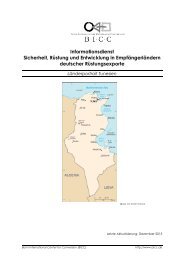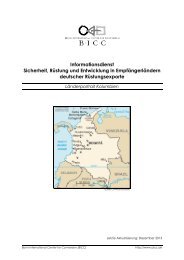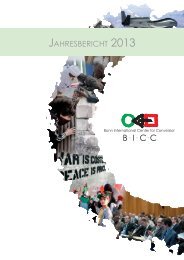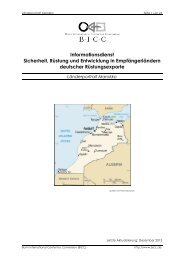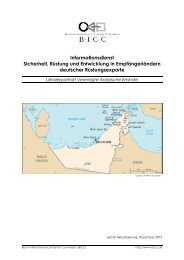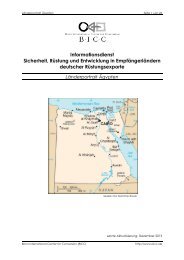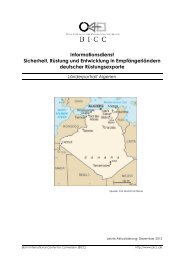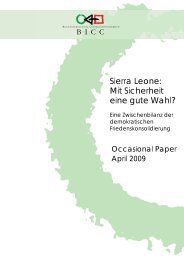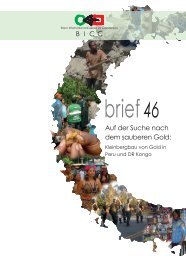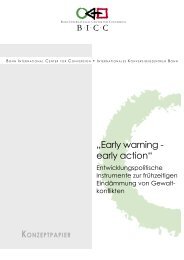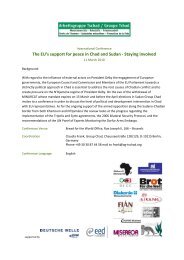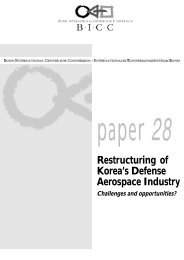English - BICC
English - BICC
English - BICC
You also want an ePaper? Increase the reach of your titles
YUMPU automatically turns print PDFs into web optimized ePapers that Google loves.
David Trimble at a press conference following a UUP Council Meeting at the Waterfront Hall<br />
in October 2000. Photo: Corinna Hauswedell<br />
their ministers to the High Court,<br />
where the ban was deemed unlawful.<br />
However this decision did not impress<br />
the Unionist leader nor prevent him<br />
from reinforcing the sanctions.<br />
In the context of Bill Clinton’s last visit<br />
as US President to Northern Ireland in<br />
December 2000, all players intensified<br />
their endeavours to save the peace<br />
process and the institutions by<br />
designing a package to link the most<br />
contentious issues in the fields of<br />
decommissioning, demilitarisation and<br />
policing more closely.<br />
The IICD report of 22 December<br />
noted that there had not yet been any<br />
progress concerning contact with the<br />
IRA, but that there was still enough<br />
time left to carry out decommissioning<br />
by the new deadline of June 2001.<br />
The first two months of the new year,<br />
during which time Peter Mandelson<br />
resigned as Secretary of State for<br />
Northern Ireland and was replaced by<br />
John Reid, attempts were made to<br />
rebuild the elements of trust which<br />
had got lost. The British Prime<br />
Minister and the Irish Taoiseach<br />
became personally involved in the<br />
negotiations. However, the talks took<br />
place against the background of<br />
increased paramilitary violence:<br />
Loyalist groups continued their bomb<br />
attacks in and around Belfast, though<br />
the UFF and the LVF maintained that<br />
their feud had not been reopened. In<br />
fact, in the first months of 2001,<br />
Catholic homes were the target of<br />
more threats and bomb attacks than in<br />
any of the three years before. On the<br />
other side, the dissident Republican<br />
group, the Real IRA, stepped up their<br />
campaign by targeting Ebrington<br />
Barracks in Derry, Londonderry in<br />
February and the BBC building in<br />
London in early March. The RUC,<br />
once more with major support from<br />
the British Army, was faced with the<br />
challenge of keeping law and order in a<br />
difficult three-folded balance typical of<br />
the Northern Ireland security situation.<br />
Policing moves<br />
up front<br />
Recruiting for the new Northern<br />
Ireland Police Service started in<br />
February in spite of the fact that both<br />
Catholic parties, the SDLP and Sinn<br />
Fein, were still opposed to relevant<br />
parts of the new Police (Northern<br />
Ireland) Act 2000 (www.hmso.gov.uk/<br />
acts/acts2000/20000032.htm). Core<br />
demands for legislative amendments<br />
from the Catholic side related to:<br />
B·I·C·C<br />
creative approaches<br />
The neutrality of the symbols of the<br />
new police force<br />
The restrictions on flags flying over<br />
police stations<br />
The powers which the police<br />
Ombudsman had to reinvestigate<br />
former killings in which there had<br />
been alleged collusion of RUC<br />
officers and Loyalist paramilitaries<br />
The extent of autonomy enjoyed by<br />
the Policing Board and the district<br />
partnerships vis-à-vis the Northern<br />
Secretary and Chief Constable<br />
The contested use of plastic bullets<br />
Whether ex-paramilitary prisoners<br />
were allowed to join the district<br />
policing partnerships.<br />
Although, at times, the SDLP blamed<br />
Sinn Fein for using the policing issue<br />
to distract from their responsibility for<br />
IRA disarmament, their combined<br />
front on these demands was neither<br />
seriously shaken by attempts on the<br />
part of the Ulster Unionists to win the<br />
moderate nationalists over to a middleground<br />
position nor by the new<br />
Secretary of State John Reid, who<br />
made it clear that he envisaged the<br />
Police Act coming into full force by<br />
June (the deadline set in May 2000 for<br />
the full implementation of the Agreement);<br />
Reid, as well, had hoped that the<br />
SDLP would more readily compromise<br />
than Sinn Fein.<br />
Hillsborough<br />
Roundtable:<br />
“parking” the deal<br />
With the British General elections and<br />
the local elections looming in spring<br />
2001, and the foot and mouth<br />
epidemic further absorbing political<br />
activity, there was an urgency for all<br />
politicians to try to wrap up the<br />
possible elements of a deal before<br />
things got out of hand again.<br />
45



